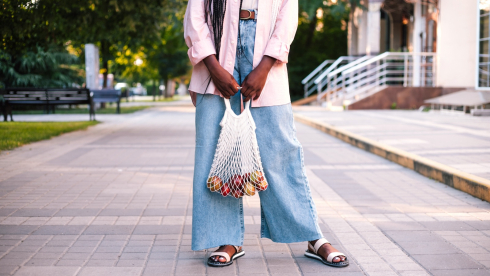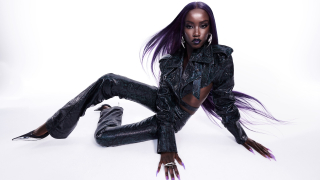For the past four years, Nikki Porcher, founder of Buy From a Black Woman (BFABW), has spent the month of July on the road. She drove from her home in Atlanta to New York City, to meet the Black women business owners who had joined her BFABW directory, a curated one-stop shopping resource for folks looking to buy products and services from companies owned and operated by Black women.
“It was literally me and my Hyundai Elantra driving up the East Coast. I wanted to celebrate my birthday month with these women. We talked via DMs but I wanted to get out and meet these women face to face and be inspired by their energy and share what they were doing with the world,” says Porcher, a Leo, who created the nonprofit in 2016 to swarm resources, including scholarships and microloans, around Black women to help them be successful entrepreneurs. Today, she has some 600 members. “We were able to grow our community very organically through the power of social media and word of mouth.”
This July, in partnership with H&M, Porcher will launch the Buy From a Black Woman Inspire Tour, a month-long series of pop-up shopping events across 15 U.S. cities, highlighting Black women owned businesses inside H&M stores. The July 1st launch in Atlanta will be followed by events in Washington D.C., New York City, Chicago and Los Angeles, in which customers can meet and shop from local vendors.
“I know my business is going to explode immediately,” says Youmie Jean Francois, founder and CEO of Flex-n-Fly which sells machine washable yoga mats at airports. Her pop-up will be on Fifth Avenue in New York City, one of the most luxurious retail stretches in the world. “My competitors are big corporations and to have the same visibility for free is incredible. I can't tell you how proud our customers are of us. We have a group of women who already have mats who have said ‘Hey, I'm going to show up to take pictures.’ It shows the value of and loyalty to Black business owners.”
“Buy Black” consciousness-consumerism is not new, but it is still needed. While Black women have been starting businesses at a faster rate than women-owned businesses in general in the past five years—21% in comparison to 43%—annual sales, overall, are five times smaller.
One reason is the lack of access to brick and mortar shelf space, says Shanae Jones, founder of Ivy’s Tea Co, a locally-sourced herbal tea company based in Washington DC. “[Retail buyers] pick one Black company and they just run it into the ground. They put them everywhere but what about all of the others. You have all of these white competitors, why don't you have more than one Black option? We have a lot we are going against. We don’t just want to be on your website. We want to be on the shelves. We deserve it.” Jones was also BFABW’s first grant recipient. “The award helped me get the materials I needed to become an herbalist so I could know what the hell I was doing,” she laughs when remembering the lean years as a start-up. “I donate a portion of my proceeds from BFABW, on average, $400 to $700 a month back to the organization so that they can continue their good work.”
While the country targets spending power to save the environment or wildlife, this generation-incarnation is shaking things up in the wake of the Black Lives Matter movement not only with the confidence to demand economic retail justice but the knowledge to build products better.
“There are a lot of brands that are targeted to Black women full of toxic chemicals in their ingredients,” says Maritza Murray, who co-founded Dirt Don’t Hurt, a made in San Diego, 100% vegan health and skincare company, along with her two sisters. “For H&M to amplify our voices as we highlight our natural selves and our natural beauty with plant-based products is life changing for our business. In toothpaste, we're competing against huge companies, like Colgate, and to get into a retail space to show these bigger brands that we support each other really puts it in their face.”
“I didn't know until I got into candle making how many harmful chemicals can be in there which is why I made the decision to use natural and safe ingredients,” says Oasis Soul Scent founder and 2019 BFABW grant recipient Lola Pyne, who will sell her wax-wicked wares at the H&M Home Georgetown branch, one of the brand's few home outlets in the country. “We're all looking for that exposure to get our product out there and to tell the story.” However, most aren’t settling for less than what they are worth.
The Dirt Don’t Hurt Sisters have rejected several other retail opportunities because those buyers wanted to nickel and dime. “The whole process in terms of pricing our product has been great [with H&M and Porcher]. It wasn’t this whole back and forth of ‘Okay, can you do it for half that price? Or, oh, can you do this?’ Nikki has been straightforward and honest and just such an asset,” says co-founder Kaya Murray.
The collaboration is a win-win for all parties involved. “We are complementing what H&M is doing but in a way that's allowing customers to be a conscious consumer, supporting their local communities and businesses, while also saying, you know what this is Black woman owned” says Porcher. “That's a flex in itself.”
The BFABW Inspire tour kicks off on July 1, 2021 in Atlanta with a free open-air market next to H&M’s Atlantic Station store, featuring 10 local vendors. The tour will continue to travel across the country concluding with an in-store event in Los Angeles on July 25, 2021.













